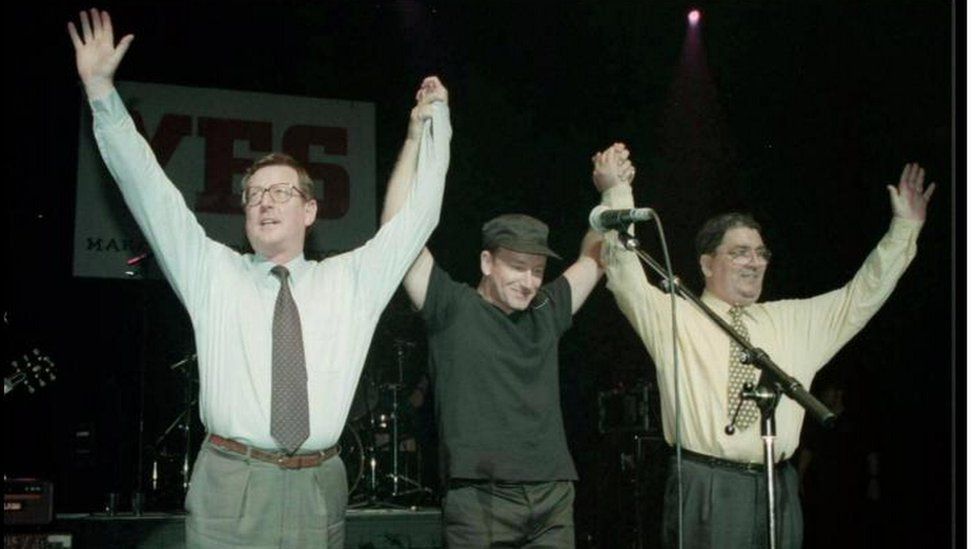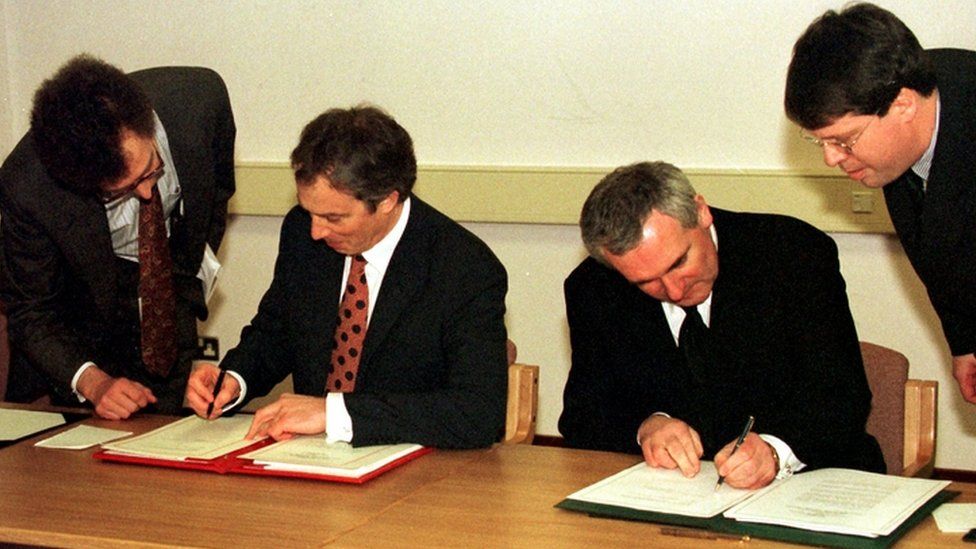The funeral of Northern Ireland’s former First Minister Lord Trimble – one of the key people involved with the Good Friday agreement – takes place on Monday.
The historic peace deal has been in the spotlight because of the UK’s departure from the European Union (EU).
What is the Good Friday Agreement?
The Good Friday Agreement, also known as the Belfast Agreement, was a political deal designed to bring an end to 30 years of violent conflict in Northern Ireland, known as the Troubles.
It was signed on 10 April 1998 and approved by public votes in Northern Ireland and the Republic of Ireland.

Image caption, U2’s Bono endorsed Lord Trimble and SDLP leader John Hume’s calls for peace ahead of the Good Friday Agreement
What were the Troubles?
Northern Ireland was created in 1921 and remained part of the UK when the rest of Ireland became an independent state.
This created a split in the population between unionists, who wish to see Northern Ireland stay within the UK, and nationalists, who want it to become part of the Republic of Ireland.
From the late 1960s, armed groups from both sides, such as the Irish Republican Army (IRA) and Ulster Volunteer Force (UVF), carried out bombings and shootings – and British troops were sent to Northern Ireland.
The Troubles lasted almost 30 years and cost the lives of more than 3,500 people.
What does the Good Friday Agreement say?

Image caption, The prime minister at the time, Tony Blair, and then Taoiseach (Irish Prime Minister) Bertie Ahern sign the Good Friday Agreement
The Good Friday Agreement is based on the idea of co-operation between communities.
It set up a new government for Northern Ireland, representing both nationalists and unionists.
The Westminster government gave this government control over key areas such as health and education – a process known as devolution.
A new parliament, the Northern Ireland Assembly, was set up and sits in Stormont, in Belfast.
Other parts of the agreement are about respect for people’s rights, whichever part of the community they come from.
- Northern Ireland is part of the UK and this can change only through a referendum – if most people in Northern Ireland want it to
- People born in Northern Ireland can have Irish or British nationality or both
As part of the agreement:
- Armed groups agreed to dispose of their weapons
- People who had been involved in violence were released from prison
- The UK government agreed to aim for “normal security arrangements” – including the scaling back of the British military presence
What does the Good Friday Agreement have to do with Brexit?
After Brexit, Northern Ireland became the only part of the UK with a land border with an EU country – the Republic of Ireland.
Checks are required on goods transported between the UK and the EU’s markets.
But both sides agreed this should not happen on the Irish border, to protect the Good Friday Agreement, because it was feared the cross-border co-operation could be threatened if new checkpoints were set up.
During the Troubles, people crossing the border were subject to British army security checks – and surveillance watchtowers were placed on hilltops.
And although the agreement does not specifically refer to the border, it does mention removing all security installations.
What has been proposed?
To keep the border clear, the UK and EU agreed the Northern Ireland protocol. Goods are checked to ensure they comply with EU rules when they arrive in Northern Ireland from the rest of the UK (England, Scotland and Wales).
Supporters of this plan, including the nationalist Sinn Fein party, say it is necessary to protect the Good Friday Agreement.
But unionist parties, including the Democratic Unionist Party (DUP), say this actually undermines the agreement because it separates them from the rest of the UK.
The DUP has refused to take part in power-sharing until its concerns are addressed.
This means the devolved government set up by the Good Friday Agreement is not currently functioning.
The UK government has also criticised the protocol, saying it has been “upsetting the balance of the Good Friday Agreement”.
It is trying to ditch parts of the agreement, with new legislation.
This has led to the current stand-off with the EU, which says the protocol is the “one and only solution” to protecting the peace process in Northern Ireland.
Source: BBC
